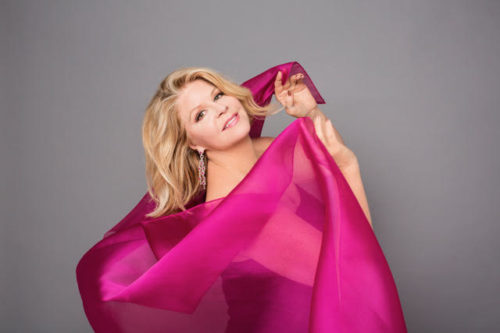 United States Various: Susan Graham (mezzo soprano), Malcolm Martineau (piano), Alice Tully Hall, New York, 4.2.2020. (RP)
United States Various: Susan Graham (mezzo soprano), Malcolm Martineau (piano), Alice Tully Hall, New York, 4.2.2020. (RP)

Schumann – Frauenliebe und -leben Op.42; Myrthen Op.25 No.11 ‘Lied der Braut I’ and No.12 ‘Lied der Braut II’
Grieg – ‘Møte’ Op.67 No.4; ‘Jeg elsker dig’ Op.5 No.3
Strauss – ‘Seitdem dein Aug’ in meines schaute’ Op.17 No.1; ‘Wiegenliedchen’ Op.49 No.3
Dankworth – ‘Shall I compare thee to a summer’s day?’
Fauré – ‘Chanson d’amour’ Op.27 No.1; ‘Au bord de l’eau’ Op.8 No.1
Rangström – ‘Melodi’
Rorem – ‘O you whom I often and silently come’
Mahler – Des Knaben Wunderhorn No.7, ‘Rheinlegendchen’
Turina – ‘Los dos miedos’ Op.14 No.4
Ravel – Cinq mélodies populaires grecques No.5, ‘Tout gai!’
Duparc – ‘Phidylé’
Debussy – Les chansons de Bilitis No.3, ‘La chevelure’
Poulenc – La courte paille No.6, ‘Le carafon’
Tchaikovsky – ‘Cradle Song’ Op.16 No.1
Berlioz – Les nuits d’été Op.7 No.4, ‘Absence’
Granados – ‘La maja dolorosa’ No.2
Quilter – ‘How should I your true love know?’
Mezzo-soprano Susan Graham is a California Girl now and has not performed in New York City for almost two years. In her breezy, warm-hearted opening remarks, she expressed her delight at being back in the city where she had many of her greatest triumphs, and especially how happy she was to be singing in Alice Tully Hall where she made her New York recital debut in 1997. Needless to say, the audience was glad to see her too. Graham is one of the bona fide opera stars from the past quarter century, and her luster hasn’t faded one bit.
I was at that recital almost 23 years ago and am happy to report that the passage of time has been kind to Graham. The voice of ‘America’s favorite mezzo’ (Gramophone) is still rich, vibrant and exciting. In this demanding program of twenty-nine songs by seventeen composers in eight languages, she brought each to life through her vivid dramatic skills and her sheer joy in singing. If anything, her ability to connect with an audience is even greater than it was way back when.
Time has not stood still, however, as extended phrases could sag, and she occasionally ran out of steam on the ascent to a high note. This was most noticeable in the two Strauss songs, ‘Seitdem dein Aug’ in meines schaute’ and ‘Wiegenliedchen’. Nonetheless, at times one could almost imagine this famous Octavian as the Marschallin. She wouldn’t be the first: Lotte Lehmann sang the Marschallin and Octavian as well as Sophie, and Christa Ludwig was a noted proponent of both roles. With Graham it was never in the cards, but one can dream.
At first blush, the structure of the recital prompted a raised eyebrow – needlessly so, however, as it worked splendidly. Graham gave full credit to pianist Malcom Martineau for coming up with the concept in which each of the eight songs of Schumann’s Frauenliebe und -leben served as the theme for a grouping of songs. The program began with the first song of the cycle, ‘Seit ich ihn gesehen’, and ended with the last, ‘Nun hast du mir den ersten Schmerz getan’. The latter’s postlude served as a meditation upon the myriad feelings that had coursed through the many songs.
Graham sought to dispel the notion that Frauenlieben und -leben was sexist. Schumann set eight of Adelbert von Chamisso’s poems which seem to infer that a woman can only find fulfillment by finding the right man, and when he dies her life is pretty much over too. Graham maintained that the poet’s original intent was one of class conflict: a young serving girl marvels that a mighty lord loves her, and it is the wonder of it all that is expressed in the poems.
Graham and Martineau maintained the arc of the Schumann cycle, which had much the same impact as if the songs had been sung without interruption. The additional songs served as prisms though which the same feelings could be experienced in different musical styles and languages. I found myself anticipating each of the eight Schumann songs because they grounded me in this kaleidoscope of musical colors and emotions.
With such a bouquet of beautiful songs, there were some favorites. Fauré’s ‘Chanson d’amour’ and ‘Au bord de l’eau’ were perfection in their delicacy and Graham’s exquisite French. The raw emotion of Granada’s ‘La maja dolorosa No.2’, a desperate lament that life is not worth living without the man whom death has so traitorously stolen, was overpowering. And every song that Graham sang in English revealed her mastery of the language, none more so than Dankworth’s ‘Shall I compare thee to a Summer’s day?’, which simply sparkled.
For an encore, they performed ‘Hello young lovers’ from The King and I. Graham said it was the ninth chapter of the woman’s life that Schumann didn’t set. There was not an iota of sentimentality in this Broadway favorite, just an outpouring of gratitude for having experienced love and warm wishes that others might share in that joy.
Then, in a split second, Graham was seated at the piano and leading the audience in ‘Happy Birthday’ in Martineau’s honor as his birthday had been the previous day. There were a lot of singers in the audience. It didn’t sound half bad.
Rick Perdian
